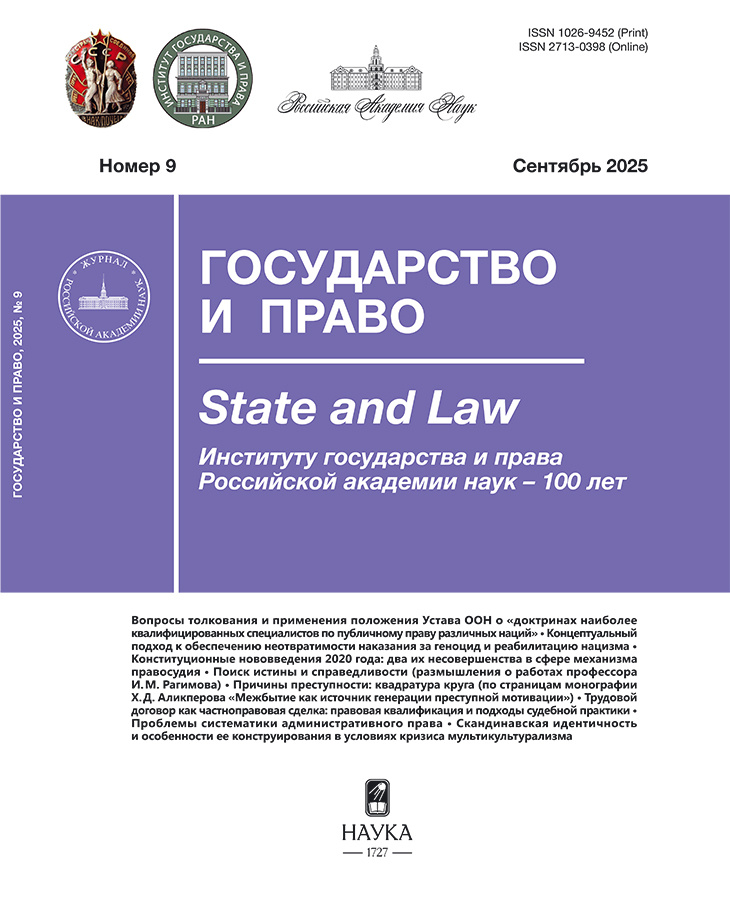Поиск
Выпуск
Название
Авторы
|
Зенин С.С. |
|
Кроткова Н.В. |
|
Гришковец А.А. |
|
Сагандыков М.С. |
|
Коновалова Л.Г. |
|
Жуков В.Н. |
|
Чечельницкий И.В. |
|
Свинин Е.В. |
|
Габов А.В., Мотуренко С.М. |
|
Храмешин С.Н. |
|
Жуков В.Н. |
|
Ахматов А.В. |
|
Фролова Е.А. |
|
Зорькин В.Д. |
|
Ящук Т.Ф. |
|
Андреев В.К. |
|
Фролова Е.А. |
|
Фролова Е.А. |
|
Коробеев А.И., Чучаев А.И. |
|
Фролова Е.А. |
|
Крашенинников П.В., Трикоз Е.Н. |
|
Нагорный И.А. |
|
Полякова Т.А., Камалова Г.Г. |
|
Глотов С.А., Алешкова И.А. |
|
Николаева Ю.В. |
|
Михайлова Е.В. |
|
Савенков А.Н. |
|
Чемезов С.В. |
|
Харджиятни Ф.Р. |
|
Устюкова В.В., Редникова Т.В. |
|
Храмешин С.Н. |
|
Яцкин А.В. |
|
Степашин С.С. |
|
Лапаева В.В. |
|
Савенков А.Н., Жуков В.Н. |
|
Добрынин Н.М. |
|
Зорилэ Д.В., Трикоз Е.Н., Туманова А.С. |
|
Сайбулаева С.А. |
|
Васечко В.Ю. |
|
Фролова Е.А. |
|
Грязнова Е.В. |
|
Шульженко Ю.Л. |
|
Боброва О.Г. |
|
Колюшин Е.И. |
|
Кабышев С.В. |
|
Андреев В.К. |
|
Летова Н.В. |
|
Михайлова Е.В. |
|
Полякова Т.А., Минбалеев А.В., Наумов В.Б. |
|
Савенков А.Н. |
|
Летова Н.В. |
|
Савенков А.Н. |
|
Шульженко Ю.Л. |
|
Мазаев В.Д. |
|
Горбань В.С. |
|
Россинский С.Б. |
|
Толстик В.А. |
|
Чучаев А.И. |
|
Савенков А.Н., Россинский С.Б. |
|
Заметина Т.В. |
|
Лукашева Е.А. |
|
Плигин В.Н., Кобзарь-Фролова М.Н. |
|
Батырь В.А. |
|
Жуков В.Н. |
|
Жуков В.Н. |
|
Савенков А.Н., Россинский С.Б. |
|
Пожарский Д.В., Кроткова Н.В. |
1 - 67 из 67 результатов
Подсказки:
- Ключевые слова чувствительны к регистру
- Английские предлоги и союзы игнорируются
- По умолчанию поиск проводится по всем ключевым словам (агенс AND экспериенцер)
- Используйте OR для поиска того или иного термина, напр. образование OR обучение
- Используйте скобки для создания сложных фраз, напр. архив ((журналов OR конференций) NOT диссертаций)
- Для поиска точной фразы используйте кавычки, напр. "научные исследования"
- Исключайте слово при помощи знака - (дефис) или оператора NOT; напр. конкурс -красоты или же конкурс NOT красоты
- Используйте * в качестве версификатора, напр. научн* охватит слова "научный", "научные" и т.д.









